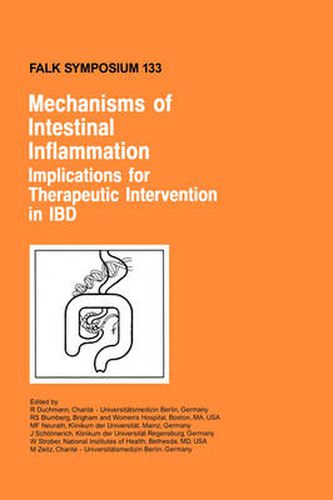Readings Newsletter
Become a Readings Member to make your shopping experience even easier.
Sign in or sign up for free!
You’re not far away from qualifying for FREE standard shipping within Australia
You’ve qualified for FREE standard shipping within Australia
The cart is loading…






This title is printed to order. This book may have been self-published. If so, we cannot guarantee the quality of the content. In the main most books will have gone through the editing process however some may not. We therefore suggest that you be aware of this before ordering this book. If in doubt check either the author or publisher’s details as we are unable to accept any returns unless they are faulty. Please contact us if you have any questions.
In recent years considerable progress has been achieved in regard to our understanding of the induction and modulation of the immune response in the intestinal mucosa. It is clear that this mucosal immune reaction is predominantly steered by certain T-cell populations, which are characterized by their cytokine secretion profile. Less well known are the conditions under which the uptake and processing of a specific antigen leads to a certain immune response, whether it be protective, tolerant or inflammatory. However, here again distinct progress has been made in our understanding. Equally significant for immune regulation in the gut appears to be so-called innate immunity. Every shift of equilibrium in the highly regulated mucosal immune reaction is accompanied by an inflammatory reaction and destruction of the mucosa. In nearly all cases, this inflammatory response is dependent on the presence of bacterial intestinal flora. This book, the proceedings of Falk Symposium 133 on Mechanisms of Intestinal Inflammation: Implications for Therapeutic Intervention in IBD’, held in Berlin, Germany, on 10-11 June 2003, summarizes present knowlege in the area of unspecific and specific immune reactions in the gut, recording the gaps in our knowledge and, in particular, presenting the possibilities of targeted intervention. The link to inflammatory bowel diseases - Crohn’s disease and ulcerative colitis - is always in focus. Chapters by an international panel of basic scientists, clinical researchers and clinicians also record the problems which can originate through today’s possible modulation of the immune reaction, setting the basis for review of clinical problems. This book is valuable readings for all scientists and physicians, who, from different perspectives, have an interest in research on IBD and in the clinical management of these diseases.
$9.00 standard shipping within Australia
FREE standard shipping within Australia for orders over $100.00
Express & International shipping calculated at checkout
This title is printed to order. This book may have been self-published. If so, we cannot guarantee the quality of the content. In the main most books will have gone through the editing process however some may not. We therefore suggest that you be aware of this before ordering this book. If in doubt check either the author or publisher’s details as we are unable to accept any returns unless they are faulty. Please contact us if you have any questions.
In recent years considerable progress has been achieved in regard to our understanding of the induction and modulation of the immune response in the intestinal mucosa. It is clear that this mucosal immune reaction is predominantly steered by certain T-cell populations, which are characterized by their cytokine secretion profile. Less well known are the conditions under which the uptake and processing of a specific antigen leads to a certain immune response, whether it be protective, tolerant or inflammatory. However, here again distinct progress has been made in our understanding. Equally significant for immune regulation in the gut appears to be so-called innate immunity. Every shift of equilibrium in the highly regulated mucosal immune reaction is accompanied by an inflammatory reaction and destruction of the mucosa. In nearly all cases, this inflammatory response is dependent on the presence of bacterial intestinal flora. This book, the proceedings of Falk Symposium 133 on Mechanisms of Intestinal Inflammation: Implications for Therapeutic Intervention in IBD’, held in Berlin, Germany, on 10-11 June 2003, summarizes present knowlege in the area of unspecific and specific immune reactions in the gut, recording the gaps in our knowledge and, in particular, presenting the possibilities of targeted intervention. The link to inflammatory bowel diseases - Crohn’s disease and ulcerative colitis - is always in focus. Chapters by an international panel of basic scientists, clinical researchers and clinicians also record the problems which can originate through today’s possible modulation of the immune reaction, setting the basis for review of clinical problems. This book is valuable readings for all scientists and physicians, who, from different perspectives, have an interest in research on IBD and in the clinical management of these diseases.